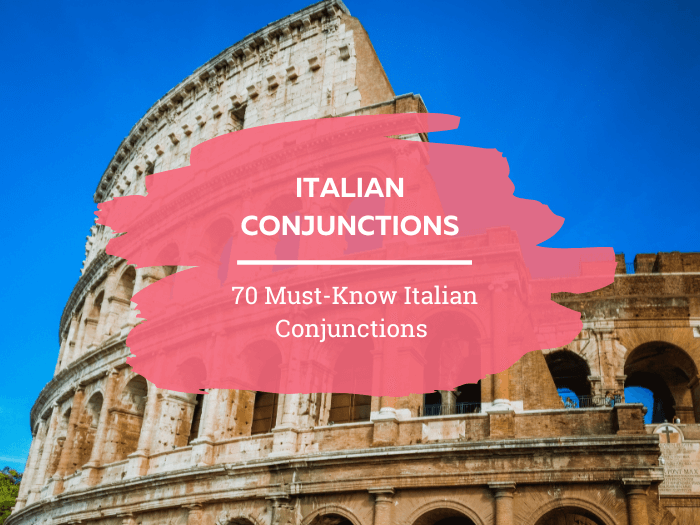Connectors are an important part of any language, but especially of learning Italian. There are an amazing number of Italian transition words, which may seem daunting, at first. But most of them are really simple and easy to remember, as you’ll see.
Some of the Italian conjunctions I mention below look like they mean the same exact thing. But there are subtle differences because in Italian, these words have different meanings depending on when you use them.
Sometimes, these differences can’t really be explained. But you’ll get the hang of using them right through practice. And that’s what I'm here to help you do!
Don’t worry if these feel overwhelming, at first. It can be said that most Italian conjunctions — connettivi — don’t count as a basic level of language learning.
This is not because transition words in Italian are especially difficult. But because not all of them are really necessary to make yourself understood. You can skip using many of them if you’re just starting out, and then pick them up bit by bit.
In any case, here is an Italian conjunctions list of 70 words to get you started, grouped from basic to more complex so you can choose the ones that suit your needs best. By the end of the post, you'll be dropping connettivi into your speech like you were born speaking that way!
By the way, if you want to learn Italian with stories, not rules, I recommend Italian Uncovered, my innovative Italian course that will teach you through StoryLearning®. Click here to find out more and try it out for yourself for free.
Table of Contents
How Italian Conjunctions Help You Sound More Fluent

Conjunctions in Italian make sentences sound better by tying them together. Speech becomes smoother, and relations between the things said become more clear. This is true for English, and most other languages, as well.
Here’s a simple example. You could, for instance, say:
- Non è stato invitato a casa di Cathy. Non le piace. – He wasn’t invited to Cathy’s house. She doesn’t like him.
Or you could say:
- Non è stato invitato a casa di Cathy perché/poichè non le piace. – He wasn’t invited to Cathy’s house because/since she doesn’t like him.
Both of those make sense and really say the same thing. But while the first version is a little chunky, the second one just sounds better.
Imagine if instead of two statements, you had five or six. As the things you learn to say in a language become more complex, connectors become increasingly useful. They are the key to fluency.
Now, let’s look at some of the other examples used in Italian, a language that loves their connettivi.
Basic Connectors In Italian
Let’s start with a list of connectors you’re most likely to encounter when learning Italian. These are the most important ones to know and, luckily, the easiest to learn.
#1 Perché – Why, Because
- Perché non hai studiato? -Why didn’t you study?
- Non ho studiato ieri perché stavo male. – I did not study yesterday because I was unwell.
#2 Insomma – Finally, Ultimately
- Il suo problema, insomma, non è chiaro. – His/her problem, ultimately, isn’t clear.
Insomma can also be used on its own, so say something like “it’s better than nothing”, or “it’s not all that bad”:
- Ho perso il portafoglio, ma ho conosciuto una donna incredible. – I lost my wallet, but I met an incredible woman.
- Insomma… – Not too bad.
#3 Anche, Anche Se – Also, Even, Even If
- Non è solo bella, è ricca anche/è anche ricca. – She is not only pretty, she is rich, too.
#4 Almeno – At Least
- Almeno sei tornato, finalmente. – At least you came back, finally (in the end).
#5 Infatti – In Fact
Infatti can informally be used on its own, as an answer, to express agreement.
- Che giornata bellissima. – What a beautiful day.
- Infatti. – I agree.
#6 Tra L’altro – As Well, Among Other Things
Often written as tralaltro even by Italians, that’s actually not right. Tra l’altro comes from tra lo altro, for “among the other”.
- Tra l’altro, non ero neppure* stato avvertito. – Among other things, I wasn’t even informed (told).
*neppure means not even — see below for pure.
#7 Così – So, So That
- Non c’era nessuno in giro, così siamo tornati a casa. – There was nobody around, so we went back home.
- Questo film è così noioso! – This movie is so boring!
#8 Così Che – So That; How + Subject
- Sii chiara così che lui capisca. – Be clear so that he’ll understand.
Or..
- É così che lo devi fare. – That’s how you are supposed to do it.
#9 Ma, Però – But, However
Sometimes, these two are interchangeable. Ma needs to be at the beginning of the statement (which can be in the middle of a sentence, as long as it is followed by a statement), while però can be at the end, as well.
- Strano ma vero. – Strange but true.
- Non sarà divertente, è necessario però. – It will not be fun, however, it is necessary.
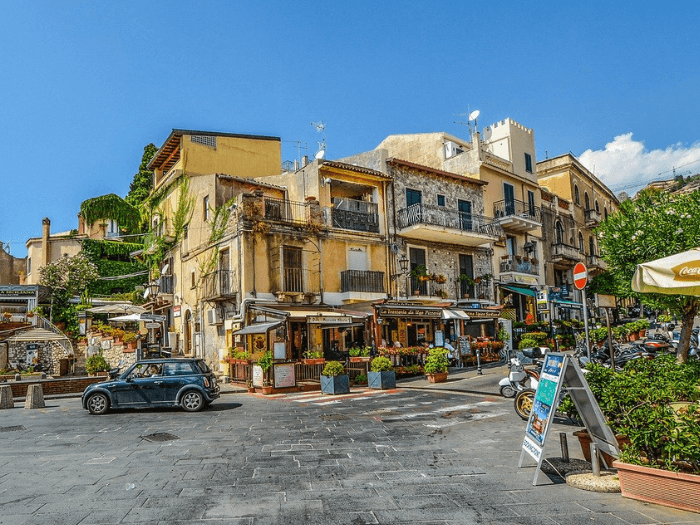
#10 Invece – Instead
- Prendo una birra invece del caffè. – I’ll take a beer instead of the coffee.
Invece can also be used, in slang, to emphasize disagreement.
- Tu non mi hai chiamato. – You did not call me.
- Invece sì! (or: Sì, invece!) – Yes, I did. (lit. instead, I did)
This is somewhat like when children say “I did too” in America.
#11 Tranne, Tranne Che, (Eccetto Che) – Except, Except For (Except That)
- Sono invitati tutti tranne Francesco. – Everybody is invited, except for Francesco.
Connettivi Temporali, Or Connectors Of Time
Fun fact: temporali is also the plural form of [thunder]storm, temporale. But here, we’re talking about connectives of time, tempo.
These are used to put a sentence in relation to something in time, meaning to say that something happened before, or during, or after something. These, especially the short ones, are pretty important.
#12 Prima – Before Or Earlier
- Prima di andare al lavoro, faccio sempre colazione. – Before going to work, I always have breakfast.
#13 Dopo – After Or Later
- Non ce la faccio prima di domani sera. – I can’t do it earlier than tomorrow evening.
- Va bene, chiamami dopo. – Fine, call me later.
- A dopo! – See you later.
#14 Qualche Giorno/Mese/Anno Fa – Some Days/Months/Years Ago
- L’ho visto qualche mese fa. – I saw him a few/some months ago.
#15 Una Volta – At One Time, Once
- Ho visto C’era una Volta nel West solamente una volta. – I only saw Once Upon a Time in the West one time.
#16 A Quei Tempi – In Those Days
- Andavamo in giro insieme a quei tempi. – We used to go out together in those days.
Note that andare in giro — lit. “going around” — does not signify dating, but going places together generally. Here, going out would be stavamo insieme, or “we were together”.
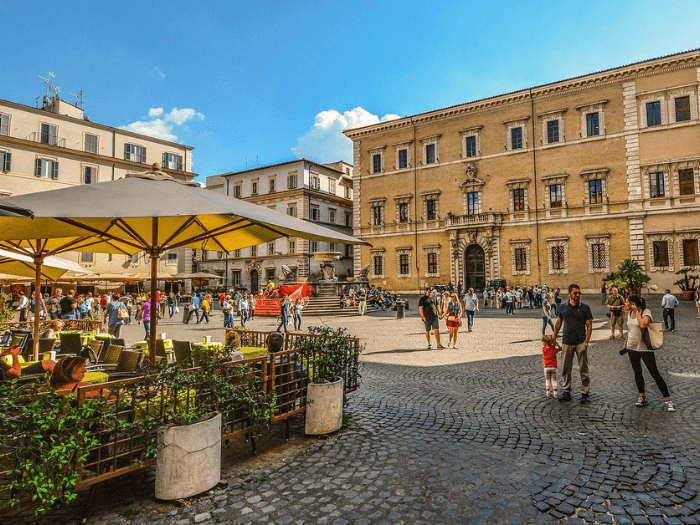
#17 Allora – And Then, So Then, And So
- E allora, cosa facciamo? – And now, what should we do?
This is one of the most versatile and most often used connectives in Italian. It can mean a lot of things, from “and then”, to “so what?”.
Most of the time, allora is sprinkled all over speech with no real meaning, as a sort of filler. Note that when spoken, the word for “at the time” sounds the same. Just keep in mind that it’s spelled differently: all’ora.
#18 Proprio Allora – Just Then, Right Then
- Dovevo vederla proprio allora. – I had to see her right then.
#19 Ora, Adesso – Now
These two can be used interchangeably.
- Adesso me ne vado/Ora me ne vado. – I am going now/now, I am going.
#20 Mentre, Nel Frattempo, Intanto Che – While, In The Meantime, In The Time That
- Intanto che/Mentre lei dormiva, io ho sistemato la camera. Nel frattempo, Giovanni è andato a fare la spesa. – While she was sleeping, I tidied up the room. In the meantime, Giovanni went grocery shopping.
#21 A Questo Punto/Momento/Istante – At This Point/Moment/Instant
- A questo punto non ti so dire di più. – At this point, I can’t tell you more.
#22 Alla Fine – At The End
Often used informally as a question meaning “so then?” Or at the end of sentences, to say “basically”, which means something like “let’s be honest here”.
See also: alla fine della fiera – literally “at the end of the fair”, this means “at the end of the day”.
- Ma alla fine della fiera, non è stata una buona esperienza. – But at the end of the day, it was not a good experience.
#23 Poi – Then, Later
- Prima o poi dovremo chiamare il meccanico. – Sooner or later we will have to call the mechanic.
- E poi? – And then?
Complex Italian Connectors
These connectors are grouped together here because they are either:
- infrequently used
- can easily be exchanged for one of the words above
- or, as with the final two examples, because they have so many meanings, and can be used in so many different ways.
#24 Siccome, Dato Che, Visto Che – Seeing As, Given That, Since
- Volevo essere onesta, visto che siamo amici. – I wanted to be honest, seeing as we are friends.
#25 Poichè – Because, Since
- Non è stato invitato a casa di Cathy poichè/perché non le piace. – He wasn’t invited to Cathy’s house since she doesn’t like him.
Poichè can sometimes be used as a synonym for perché, as in the case above. But only when it is used in the sense of “because”, not in the sense of why. Easier: just don’t use poichè in a question.
#26 Gia’ ché, Giacché – Since Already, Now That
- Mangiamo qualcosa giacché sei qua. – Let’s eat something, now that/since you're here.
#27 Innanzitutto, Prima Di Tutto – First Of All, Before Anything
- Innanzitutto bevo un bicchiere di vino. – First of all, I’ll drink a glass of wine.
- Prima di tutto, so che sei una persona onesta, oltre a ciò sei gentilissimo. – First of all I know that you are an honest person, other than that you are also very kind.

#28 Cioè – Meaning That, Which Means, i.e.
- Sono arrivato il 13, cioè venerdì. – I arrived on the 13th, meaning Friday.
It can also be used as a question by itself, as in “what does that mean?” or “what is that supposed to mean?”. You can also hear it used as “filler” in a sentence similarly to the word “like” in English
#29 Perciò – For That Reason
(per – for, ciò – this, that)
- Mi sento male, perciò non esco. – I don’t feel well, so for that reason, I’m not going out.
#30 Ciononostante, Nonostante Ciò – Notwithstanding, Regardless
- Pioveva tutto il giorno, ma io sono divertita nonostante ciò. – It rained all day, but I had fun regardless.
#31 Malgrado Ciò – Despite
- Continuano a lavorare malgrado siano stanchi. – They continue to work despite being tired.
#32 Comunque – Anyway, However, Whichever Way
This is a word that’s easy to use, and is also used very often. But because it has so many subtle differences in meaning, I’ve put it down here with the more complex ones.
The good thing about comunque is that you can use it as much as you like, and it’ll most likely be correct. The closest thing to comunque in English is “anyway”.
- Non sai dov'è? Grazie comunque. – You don't know where he/she/it is? Thanks anyway.
- Non sarà facile… Comunque, ci proverò. – It will not be easy… Anyway, I'll try.
Then, comunque can also mean something like “nevertheless”. This is only a slight difference from anyway, and could be translated as that, in some cases.
- Abbiamo avuto dei problemi, comunque poteva andare peggio. – We had some issues/problems, but still, things could have gone worse.
Comunque sometimes also means “however” or “no matter which way”. This is sort of like “any way” rather than “anyway”, which is different but still similar, in a way.
- Questa lettera, comunque interpretata, non prova nulla. – This letter, no matter how it's interpreted, doesn't prove anything.
- Comunque vada questa cosa, io ci sarò per te. – However this thing might go, I'll be there for you.
Finally, in Italian slang, it can be used as meaningless filler, just like “anyway” is in English. Which is why, as mentioned, you can really put it almost anywhere.
#33 Quindi – So That, So Then, Therefore
You would use this all the time as a question, meaning “so what?”, but also to say something like “so then I did this or that”.
- Sta piovendo, quindi portati un ombrello. – It's raining, so take an umbrella.
- Si tratta quindi di una cosa significativa. – It is therefore a significant thing.
- Penso, quindi sono. I think, therefore I am.
Quindi can also mean then or next:
- Continua diritto, quindi gira a sinistra. – Keep going straight, then turn left.
- Ho cenato, quindi sono andata a dormire. – I had dinner, then I went to sleep.
But the best thing about quindi is that because it means such a small thing, “so”, you can use it almost anywhere, almost always – just like allora or comunque.
You can put it in the beginning of a sentence, in the middle, at the end. It’s the one thing that will make you sound more Italian than any other, quindi…
- Quindi alla fine, è andato tutto bene. – So ultimately, it went well.
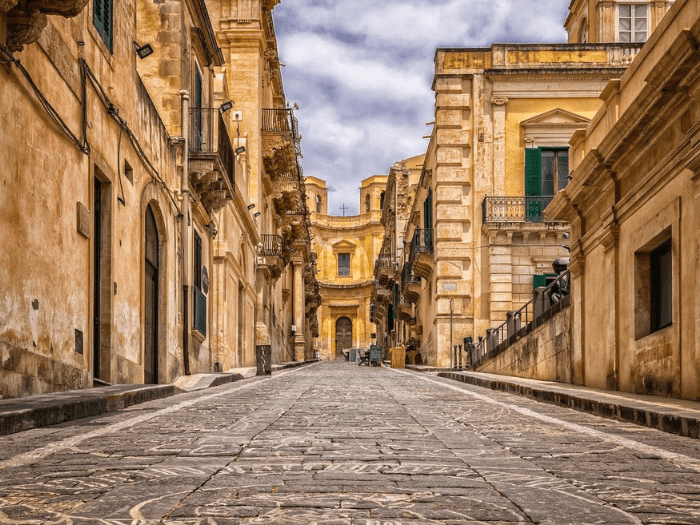
#34 Eppure – Still, Even So
- Sono uscito prima questa mattina, eppure non sono arrivato in tempo. – I left the house earlier this morning, and still/even so did not arrive in time.
#35 Pure – Also, Even If, Despite
Pure is somewhat complicated, which is why I’ve chosen it as the last entry. The good news is that there is almost no time when you have to use this and can’t substitute it.
But there is a unique joy in mastering this little connector. And it’s not that hard: just use it in one form, at first, and the rest will follow.
- Oggi ho comprato una gonna e pure un paio di scarpe. – Today I bought a skirt and also a pair of shoes.
Pure can be used to express doubt, or uncertainty in the face of something obvious:
- La sua voce è davvero pessima. Bisognerà pure dirglielo prima o poi. – His voice is really terrible, we might have to tell him sooner or later.
Or signal that you’re welcome to go ahead with something:
- Prego, signorina, venga pure! – Please, miss, come right in!
Easily enough, it is used wherever you’d use “even” in English:
- La ama così tanto che darebbe pure la vita per lei. – He loves her so much, he’d even give his life for her.
- Pur* avendo lavorato molto, Giuseppe non guadagnava. – Even working a lot, Giuseppe did not earn.
*the e is missing at the end of pure here because the next word is a so-called gerundio, or gerund. This is a verb used as a noun, which is essentially a word that ends with “ing” in English.
Pure, like the articles in German or the different sounds letter combinations make in English (through or tough, trough, cough, and so on it goes) is often a matter of feeling.
This gives it an intuitive quality that isn’t easily explained, but that doesn’t mean it is hard to get your head around. Practice and listen, and it’ll come to you sooner than you think. Or apply the StoryLearning® method, and look out for it as you read and listen to Italian.
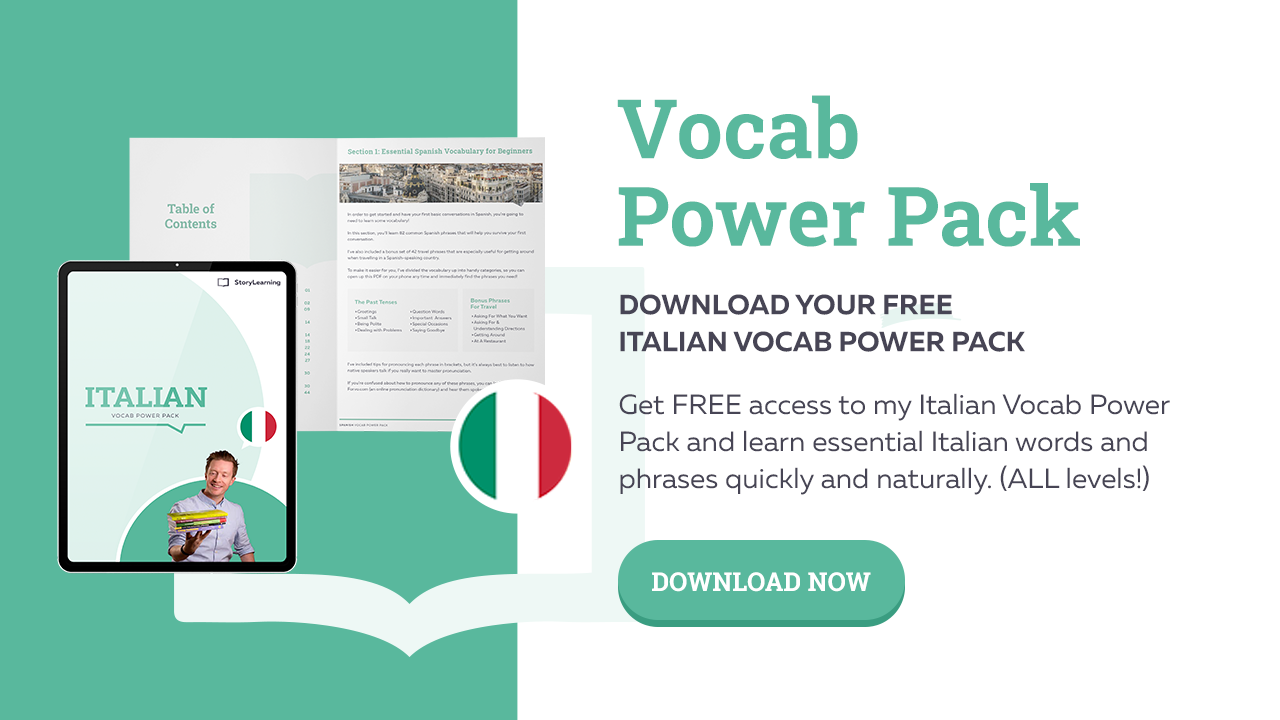
Bonus Italian Conjunctions
As we're on a roll now, here are some more words to add to your Italian conjunctions chart. You'll find Italian connectors for pretty much any and every situation!
#36 A Volte – Sometimes
- A volte faccio fatica ad addormentarmi. – Sometimes I have a hard time falling asleep.
#37 A Parte – Except; Besides
- Lisa è molto simpatica, a parte quando è al lavoro. – Lisa is really funny, except when she is at work.
#38 Ad Esempio – For Example; For Instance
- Ci sono molti modi per rimettersi in forma, ad esempio l’esercizio fisico e una dieta equilibrata. There are many ways of getting back into shape, for instance exercising and a healthy diet.
#39 Ad Un Certo Punto – At A Certain Point
- Ad un certo punto dovremmo rimettere a posto i documenti che hai nel cassetto. – At a certain point we should re-organize the documents you have in your drawer.

#40 Affinché – So That; In Order To
- Le rose hanno bisogno di molte cure affinché crescano bene. – Roses need a lot of care in order to grow well.
#41 Altrimenti – Otherwise
- Rimetti subito a posto la tua stanza, altrimenti la mamma si arrabbierà moltissimo. – Clean up your room right now; otherwise mom will be very angry.
#42 Ancora – Yet; Still
- Dopo tre ore il treno non era ancora arrivato a destinazione. – After three hours, the train had still not arrived at its destination.
#43 Anzi – Rather; On The Contrary; In Fact; Actually
You can also use anzi as an exclamation to emphasize that something is completely the opposite of what has been said.
- É un buon investimento, anzi ottimo! – It is a good investment, in fact, it’s excellent!
Or….
- Non sono affatto più vecchia, anzi! – I am not older at all, actually!
#44 Appena – Just
- Marco era appena uscito di casa quando si è ricordato delle chiavi. – Marco had just left his home, when he remembered his keys.
#45 Come – As; Like; Similarly
- Sandro è alto come suo padre. – Sandro is tall like his dad.
#46 Dal Momento Che – Since
- Dal momento che alcuni dei nostri studenti si sono trasferiti, la nostra classe è molto più tranquilla. – Since some of our students moved, our class is much more quiet.
#47 Dato Il Fatto Che – Given The Fact That…
- Dato il fatto che non abbiamo più soldi, sarebbe meglio se tornassimo a casa. – Given the fact that we have no more money, it would be better going home.
#48 Di Solito – Usually
- Di solito l’autobus passa ogni 15 minuti. – Usually the bus comes every 15 minutes.
#49 Forse – Maybe
- Forse dovresti smettere di mangiare così tanto. – Maybe you should stop eating so much.

#50 Finalmente – Finally
- Finalmente sono in vacanza e posso leggere il mio libro nuovo! – Finally I am on vacation and I can read my new book.
#51 In Altre Parole – In Other Words
- In altre parole, non è cambiato niente. – In other words, nothing changed.
#52 In Particolare – In Particular
- I cani, in particolare, sono creature molto affettuose. – Dogs, in particular, are really affectionate creatures.
#53 In Primo Luogo – In The First Place; Firstly
- In primo luogo, vorrei ringraziare il mio supervisore di tesi per il suo supporto. – Firstly, I would like to thank my thesis supervisor for his/her support.
#54 In Tal Caso – In That Case
- In tal caso è meglio rimandare a domani. – In that case, it’s better to postpone until tomorrow.
#55 Mettere Il Caso (Mettiamo Il Caso; Metti Caso) – Suppose That; Let’s Say That; Let’s Suppose
- Mettiamo il caso che il ristorante sia chiuso, dove andremmo a mangiare? – Suppose that the restaurant is closed, where would we go to eat?
#56 Nè… Nè – Neither…Nor
- Nè la pioggia nè il vento gli avrebbero impedito di uscire quella sera. – Neither rain nor wind would have kept him from going out that night.
#57 Nel Caso (In Cui) – In Case (That)
- Nel caso in cui tu decida di uscire, potresti passare al supermercato? – In case you decide to go out, could you stop by the supermarket?
#58 Non Appena – As Soon As
- Non appena aprì la porta, si rese conto che il prigioniero era scappato! – As soon as he opened the door, he realized the prisoner had escaped!
#59 Non Solo… Ma Anche – Not Only…But Also
- Shakespeare è conosciuto non solo in Inghilterra ma anche in tutto il resto del mondo. – Shakespeare is not only known in England, but also in the rest of the world.

#60 Oppure – Or
- Potremmo andare al cinema oppure potremmo vedere un film a casa. – We could go to the cinema, or we could watch a movie at home.
#61 Per Esempio – For Example; For Instance
- Ci sono un sacco di posti che vorrei visitare: la Thailandia, per esempio! – There are many places that I would like to visit: Thailand, for example!
#62 Poniamo Il Caso Che – Let’s Suppose That
- Poniamo il caso che l’assassino si sia liberato dell’arma del delitto qui vicino, dovremmo riuscire a trovarla. – Let’s suppose that the murderer got rid of the weapon nearby. We should be able to find it!
#63 Prima…Poi – Before…After ; First…Then
- Prima pranziamo poi possiamo rimetterci a studiare. – First we have lunch, then we can start studying again.
#64 Purtroppo – Unfortunately
- Purtroppo non posso aiutarti. Sono troppo occupata. – Unfortunately, I cannot help you. I am too busy.
#65 Qualora – If ; Insofar
- Ricordati di avvisarmi qualora tu fossi in ritardo. – Remember to call me if you are going to be late.
#66 Quando – When
- Quando penso a mia sorella ricordo ancora com’eravamo da bambine. – When I think of my sister, I still remember how we were as children.
#67 Se – If
- Se avessi studiato di più, non avresti preso un voto così basso! – If you had studied more, you wouldn’t have gotten such a low score!
#68 Se è Vero Che – If It’s True That
- Se è vero che la pazienza è una virtù, mia nonna è la persona più virtuosa che conosca! – If it’s true that patience is a virtue, my grandmore is the most virtuous person I know!
#69 Sia…Sia/Sia…Che – And…And ; Both…And
- Per dimagrire servono sia una buona dieta che esercizio fisico. – To lose weight you need both a good diet and exercise.
#70 Tuttavia – Nonetheless
- Lucia sembra distratta, tuttavia è comprensibile. – Lucia seems distracted. Nonetheless, it’s understandable.
Italian Conjunctions FAQ
What are the conjunctions in Italian?
Conjunctions in Italian connect words, phrases, or clauses. Common types include:
Coordinating Conjunctions: e (and), ma (but), o (or), però (however).
Subordinating Conjunctions: perché (because), se (if), quando (when), che (that).
Correlative Conjunctions: sia…sia (both…and), né…né (neither…nor).
When to use Dunque?
Dunque means “therefore” or “so” and is used to indicate a conclusion or result. For example:
Hai studiato molto; dunque, passerai l’esame. (You studied a lot; therefore, you will pass the exam.)
It is common in formal or written Italian but also used in casual speech to mean “well then” as a conversation filler.
What is Allora?
Allora has several meanings depending on context:
– “Then” or “at that time”: Allora ero più giovane. (I was younger then.)
– “So” or “well”: Used to start or continue a thought: Allora, che facciamo? (Well, what are we doing?)
– “In that case”: Se sei stanco, allora riposati. (If you're tired, then rest.)
Where does “also” go in an Italian sentence?
The word for “also” in Italian is anche. Its position depends on what you want to emphasise:
Before the verb: Anche studio italiano. (I also study Italian.)
Before the subject: Anche Maria è venuta. (Maria also came.)
Before the object: Studio anche la storia. (I study history as well.)
One Of The Keys To Italian Fluency

Italian communication is famously expressive. Lots of body language is involved, and a healthy amount of exaggeration and emphasis.
Italian conjunctions help this beautiful language bloom in all its dramatic glory. And they will serve you better in becoming fluent in Italian than any other type of word.
That's right, you don't need perfect Italian grammar (no matter what the grammar villain might say) or a vocabulary of 10,000 words to sound like an Italian. Sometimes, it really is the little things, like these Italian connectors, that count.
So get out there and start using them in your Italian conversations. And make sure you try to spot Italian connectors whenever you're reading in Italian. Or in whatever medium you like to use to immerse yourself in the language, like Italian podcasts or Italian movies.

Olly Richards
Creator of the StoryLearning® Method
Olly Richards is a renowned polyglot and language learning expert with over 15 years of experience teaching millions through his innovative StoryLearning® method. He is the creator of StoryLearning, one of the world's largest language learning blogs with 500,000+ monthly readers.
Olly has authored 30+ language learning books and courses, including the bestselling "Short Stories" series published by Teach Yourself.
When not developing new teaching methods, Richards practices what he preaches—he speaks 8 languages fluently and continues learning new ones through his own methodology.
